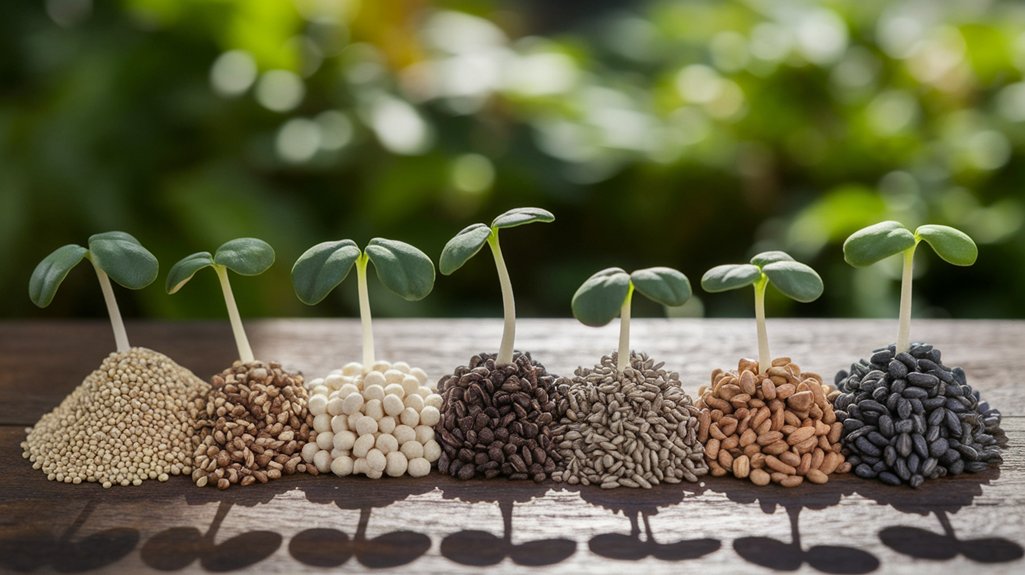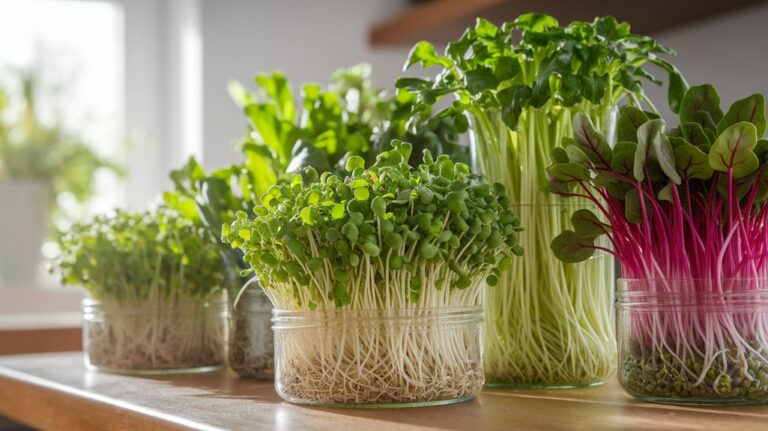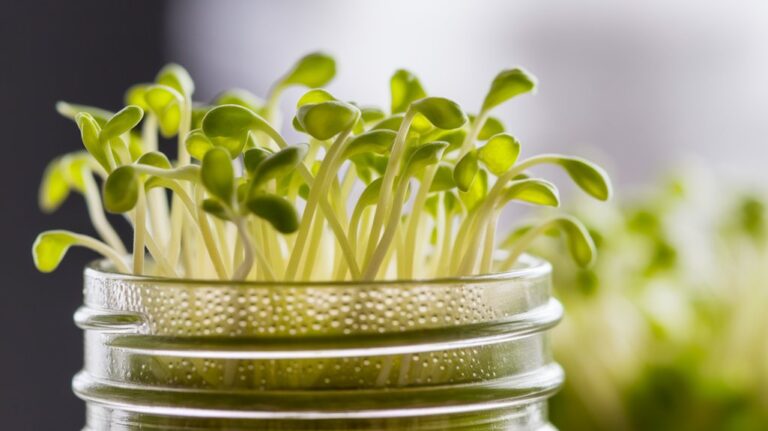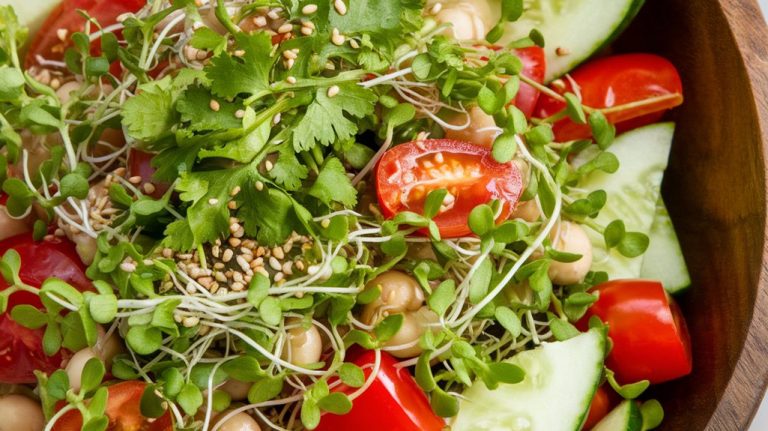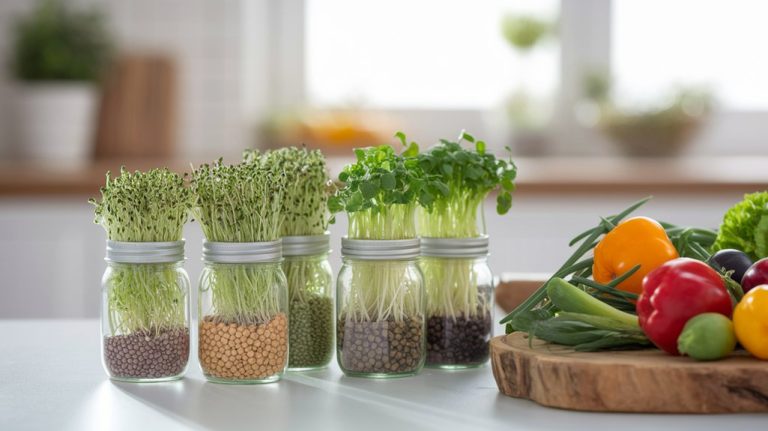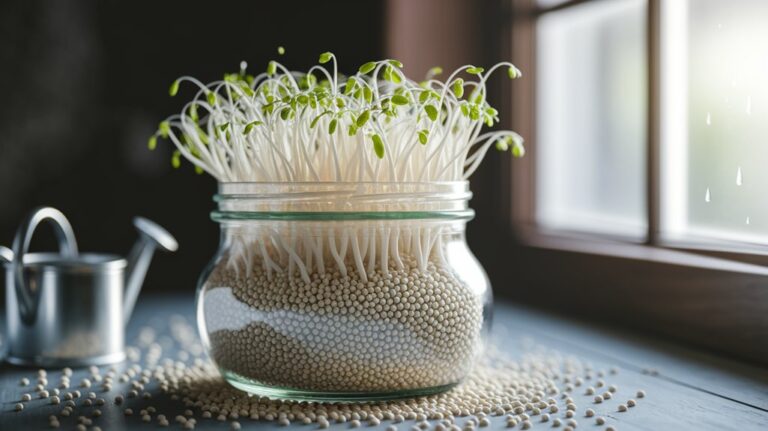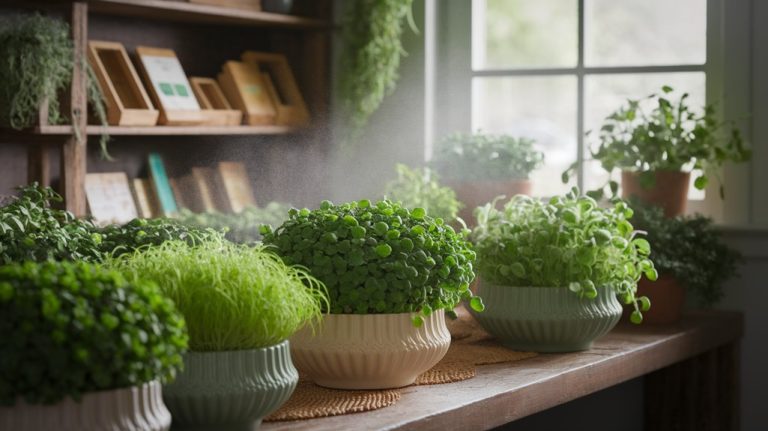Top 7 Seeds to Start Sprouting Today
If you’re looking to start sprouting seeds, I recommend alfalfa, broccoli, mung bean, lentil, radish, sunflower, and chia seeds. Alfalfa and broccoli germinate quickly and pack a nutritional punch. Mung and lentil beans are rich in protein, while radish seeds add a spice to dishes. Sunflower sprouts are versatile and chia seeds offer omega-3s and fiber. Each seed has unique benefits and flavors, making sprouting worthwhile. Let’s explore each of these options further!
Key Takeaways
- Alfalfa seeds germinate quickly in 3 to 5 days, offering a mild flavor and rich nutritional profile for salads and sandwiches.
- Broccoli seeds are packed with vitamins and antioxidants, making them a crunchy, nutrient-dense addition to meals.
- Mung bean seeds provide high protein and fiber, supporting muscle repair and digestive health while having a low glycemic index.
- Lentil seeds are rich in protein and fiber, making them an excellent choice for plant-based diets and promoting digestive health.
- Radish and sunflower seeds add unique flavors and textures, with radish providing a spicy taste and sunflower sprouts boosting protein and vitamins.
Alfalfa Seeds
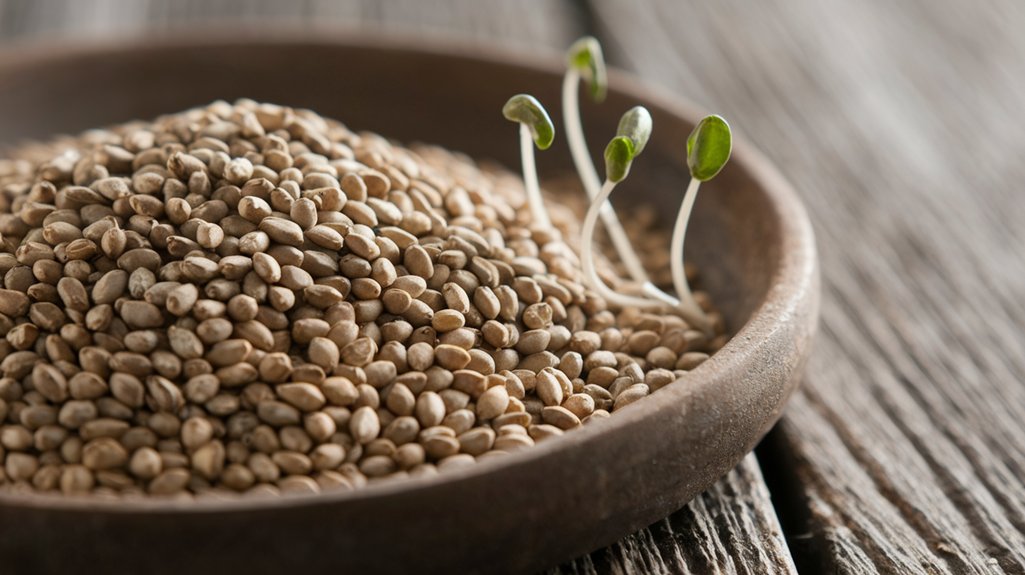
Alfalfa seeds are a fantastic choice for anyone looking to start sprouting at home. They germinate quickly, usually within 3 to 5 days, making them perfect for beginners.
I appreciate their mild, nutty flavor that enhances salads and sandwiches. Nutritionally, alfalfa sprouts are rich in vitamins A, C, E, and K, along with essential minerals like calcium and magnesium.
The process is simple: soak the seeds for a few hours, then rinse and drain them twice daily until they sprout. I find that keeping them in a well-ventilated area prevents mold.
Additionally, alfalfa sprouts are versatile—adding them to various dishes boosts both flavor and health benefits. Overall, they’re an excellent addition to my home sprouting endeavors.
Broccoli Seeds
Broccoli seeds offer a nutrient-packed option for home sprouting enthusiasts. These tiny powerhouses are rich in vitamins, minerals, and antioxidants, making them an excellent addition to any diet. I find that sprouting broccoli seeds is straightforward and rewarding. They typically germinate within 3-5 days, providing a fresh, crunchy addition to salads or sandwiches.
Here’s a quick comparison of broccoli seeds with other popular sprouts:
| Seed Type | Nutritional Benefits | Germination Time |
|---|---|---|
| Broccoli | High in vitamins C, K, and A | 3-5 days |
| Alfalfa | Good source of protein | 5-7 days |
| Radish | Rich in antioxidants | 4-6 days |
| Clover | Contains essential amino acids | 5-7 days |
Mung Bean Seeds
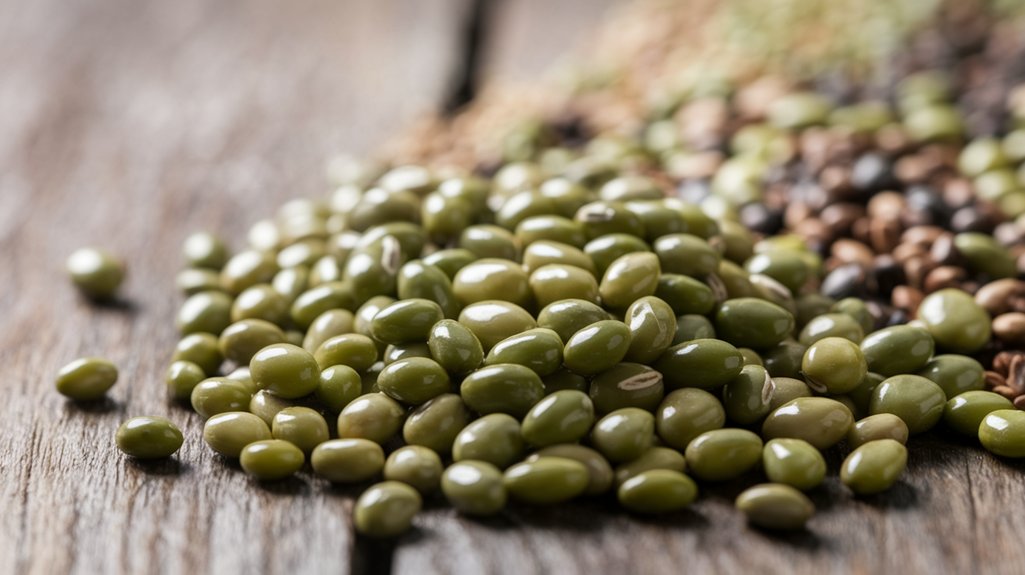
Mung bean seeds are an excellent choice for anyone looking to boost their diet with nutritious options.
I find their high protein content and rich vitamins particularly appealing, especially when considering their health benefits.
Plus, the sprouting techniques for mung beans are straightforward, making them accessible for beginners and seasoned sprouters alike.
Nutritional Benefits of Mung Beans
When exploring plant-based nutrition, mung beans stand out due to their impressive health benefits. I’ve found these tiny legumes to be a powerhouse of nutrition, making them a staple in my diet.
Mung beans are particularly known for:
- High protein content: They provide an excellent source of plant-based protein, which is crucial for muscle repair and growth.
- Rich in fiber: This aids digestion and helps maintain a healthy gut.
- Low glycemic index: Mung beans have a low impact on blood sugar levels, making them ideal for those managing diabetes.
- Packed with vitamins and minerals: They contain essential nutrients like folate, magnesium, and potassium, supporting overall health.
Incorporating mung beans into your meals can significantly enhance your nutritional intake!
Easy Sprouting Techniques
Sprouting mung bean seeds is a simple and rewarding process that can transform your meals. I’ve found that following a few easy steps makes the experience enjoyable. Here’s how I do it:
- Soak: Rinse seeds and soak them in water for 8 hours.
- Drain: After soaking, drain the water and place seeds in a jar or sprouter.
- Rinse: Rinse and drain every 8-12 hours for 2-5 days.
- Harvest: Once they reach desired length, rinse and enjoy!
Here’s a quick reference table for your sprouting journey:
| Step | Duration | Tips |
|---|---|---|
| Soak | 8 hours | Use enough water |
| Rinse | Every 8-12 hrs | Keep them moist |
| Grow | 2-5 days | Store in a dark place |
| Enjoy | Anytime | Add to salads or stir-fries |
Happy sprouting!
Lentil Seeds
Lentil seeds are a powerhouse of nutrition, packed with protein, fiber, and essential vitamins.
I’ll explain how to sprout them effectively, allowing you to enjoy their health benefits in your meals.
Plus, I’ll share some creative culinary uses for these nutritious sprouts that can elevate your dishes.
Nutritional Benefits of Lentils
While many people may overlook lentils as just another legume, they actually pack a powerful nutritional punch that can significantly enhance any diet.
I’ve discovered that incorporating lentils into my meals offers numerous health benefits. Here are some key nutritional highlights:
- High in protein: Lentils are a fantastic plant-based protein source, making them ideal for vegans and vegetarians.
- Rich in fiber: They promote digestive health and help maintain a healthy weight.
- Packed with vitamins and minerals: Lentils contain essential nutrients like iron, folate, and magnesium.
- Low in calories: They provide a filling option without the extra calories, supporting weight management.
Considering these benefits, I believe lentils deserve a spot in everyone’s pantry!
Sprouting Process Explained
When I decided to explore the sprouting process for lentil seeds, I quickly realized that it’s a simple yet fascinating endeavor. Here’s a breakdown of the steps involved:
| Step | Description | Timing |
|---|---|---|
| 1. Rinse | Rinse the lentils under water. | 5 minutes |
| 2. Soak | Soak in water for hydration. | 8-12 hours |
| 3. Drain | Drain and rinse again. | 2 minutes |
| 4. Sprout | Place in a sprouting jar. | 3-5 days |
This process encourages germination, leading to nutritious sprouts. I found that keeping the lentils moist and in a dark environment helps them sprout effectively. It’s a rewarding experience that connects you directly to the growth of your food.
Culinary Uses for Sprouts
Sprouts add a delightful crunch and nutritional boost to various dishes.
I’ve found that lentil sprouts, in particular, are incredibly versatile and can enhance flavors and textures in many meals.
Here are some culinary uses I’ve enjoyed:
- Salads: Toss them into a fresh salad for added crunch and protein.
- Wraps: Use them in wraps or sandwiches to introduce a delightful texture.
- Soups: Stir them into soups for a nutritional kick and vibrant look.
- Stir-fries: Add them at the end of cooking to retain their crispness.
Radish Seeds
Radish seeds are a fantastic choice for anyone looking to dive into gardening, thanks to their quick germination and vibrant flavors. I’ve found that they typically sprout within just 3 to 10 days, making them one of the fastest options available. This rapid growth allows me to enjoy fresh radish sprouts in no time.
Plus, their peppery taste adds a delightful kick to salads and sandwiches.
When planting, I recommend using a light, well-draining soil and ensuring they receive plenty of sunlight. Radish sprouts thrive in cooler temperatures, so I often plant them in early spring or fall.
With minimal care, I can easily incorporate these nutritious sprouts into my meals, enhancing both flavor and health benefits.
Sunflower Seeds
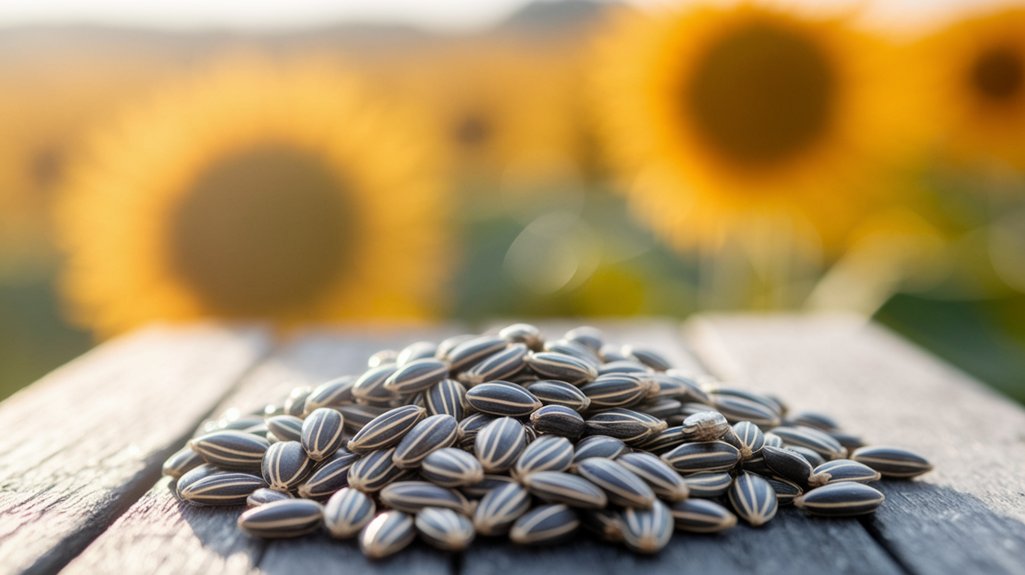
Although many gardeners focus on more traditional crops, sunflower seeds offer a unique and rewarding experience.
I’ve found that sprouting sunflower seeds isn’t only easy but also beneficial for my health. These seeds are packed with nutrients and add a delightful crunch to salads or sandwiches.
Here are some key benefits of sprouting sunflower seeds:
- High in Protein: They provide a great plant-based protein source.
- Rich in Vitamins: Sunflower sprouts contain essential vitamins like E and B.
- Antioxidant Properties: They help combat oxidative stress in the body.
- Versatile Use: Perfect for salads, wraps, or as a snack.
I encourage you to consider adding sunflower seeds to your sprouting repertoire!
Chia Seeds
Chia seeds are a powerhouse of nutrition that I find fascinating for their sprouting potential. They’re rich in omega-3 fatty acids, fiber, and protein, making them an excellent addition to any diet.
When sprouted, chia seeds develop tiny, nutritious shoots that can enhance salads, smoothies, and sandwiches. Sprouting is simple; just soak the seeds in water for a few hours, then rinse and drain them twice daily.
Within a few days, you’ll see the sprouts emerge. Not only do they add a crunchy texture, but they also boost the nutritional profile of your meals.
I love experimenting with chia sprouts in various dishes, and I’m always amazed at how easy it’s to grow them right at home.
Frequently Asked Questions
How Long Do Sprouts Typically Take to Grow?
When I grow sprouts, I find that they typically take about 5 to 14 days to mature, depending on the variety.
For instance, alfalfa sprouts can be ready in just 5 days, while larger seeds like peas might take closer to 10 to 14 days.
I always keep an eye on them, ensuring they’re properly rinsed and have enough light.
This way, I can enjoy fresh, nutritious sprouts at their peak flavor.
Can I Sprout Seeds in Soil Instead of Water?
Yes, you can sprout seeds in soil instead of water! I’ve tried both methods, and soil offers a different texture and nutrition for the sprouts.
When I use soil, I ensure it’s moist but not soggy, allowing the seeds to germinate effectively. The key is to maintain humidity and provide adequate light.
Just be prepared for a slightly longer sprouting time compared to the water method. It’s a rewarding process!
Are There Any Seeds That Shouldn’T Be Sprouted?
Not all seeds are suitable for sprouting. I’ve found that seeds from certain plants, like nightshades and some perennial flowers, can produce toxic substances or are simply not viable for consumption.
Additionally, large seeds, such as those from avocado or mango, aren’t typically sprouted for food. It’s always wise to research the specific seeds you’re interested in to ensure they’re safe and suitable for sprouting.
Knowledge is key for successful sprouting!
How Do I Store Sprouted Seeds?
Storing sprouted seeds properly is essential for maintaining their freshness and nutritional value.
I usually place them in an airtight container lined with a paper towel to absorb any excess moisture.
Then, I store them in the refrigerator, where they can last for about a week.
If I want to keep them longer, I freeze them in a sealed bag.
This way, I ensure I can enjoy their health benefits when I need them!
What Are the Health Benefits of Eating Sprouts?
Eating sprouts offers numerous health benefits that I find fascinating. They’re rich in vitamins, minerals, and antioxidants, which support overall wellness.
I appreciate how they can boost digestion due to their high enzyme content. Additionally, sprouts can enhance my immune system and provide a good source of plant-based protein.
I’ve noticed that incorporating them into my meals adds not just nutrition but also a delightful crunch. They truly elevate my diet!
Conclusion
In conclusion, starting to sprout these seven seeds can transform your meals and boost your nutrition. Each seed offers unique flavors and health benefits, making them versatile additions to your diet. By incorporating alfalfa, broccoli, mung beans, lentils, radishes, sunflowers, and chia seeds into your routine, you’ll enjoy fresh, crunchy sprouts packed with vitamins and minerals. So, why wait? Get started today and experience the difference these powerhouse seeds can make in your culinary creations.

